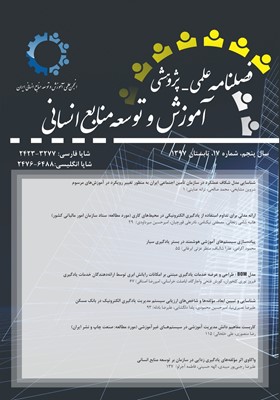تبیین الگوي تدوین برنامه توسعه فردي مديران منابع انساني در صنعت بانكداري
محورهای موضوعی :آرین قلی پور 1 , ابوالحسن فقیهی 2 , محمدعلی شاه حسینی 3 , بهارک سفیدگران 4
1 - دانشگاه تهران
2 - دانشگاه ازاد اسلامی واحد علوم و تحقیقات
3 - دانشگاه تهران
4 - بانک رفاه کارگران
کلید واژه: منابع انسانی, شایستگی, برنامه توسعه فردی, توسعه مدیران منابع انسانی, صنعت بانکداری.,
چکیده مقاله :
امروزه مدیران، بویژه مدیران منابع انسانی به عنوان شاخصترین هدایتکننده برنامههای توسعه شناخته میشوند و درصورتی میتوانند این مهم را به شیوهای مطلوب اجرایی نمایند که خود، برخوردار از روحیه یادگیری و برنامهای مدون برای طی مسیر تعالی فردی باشند. ین پژوهش با هدف ارائه الگوی برنامه توسعه فردی مدیران منابع انسانی صنعت بانکداری و تبیین اجزا و مولفههای برنامه توسعه و روابط ميان آنها صورت پذیرفته است. نخست؛ پیشینه موضوع، دیدگاهها و تحقیقات مختلف درخصوص برنامه توسعه فردی به صورت گسترده مورد مطالعه قرار گرفت و با بهرهگیری از نتایج این گام، الگوی اولیه طراحی گردید. سپس مصاحبههای نیمهساختاریافته با 14 نفر از مدیران ارشد منابع انسانی سیستم بانکی صورت پذیرفت و دادههای حاصل با روش تحلیل تم و با بهره جستن از نرم افزار QSR Nvivo تحلیل شد. در ادامه مصاحبه گروهی در قالب تشکیل گروه کانونی با حضور 6 نفر از متخصصین منابع انسانی در صنعت بانکداری و اساتید صاحبنظر در این حوزه برای اعتباربخشی به چارچوب الگوی پیشنهادی انجام گرفت و در نهایت به منظور اعتباردهي و اولويتبندي مولفههاي مزبور، توزیع پرسشنامه بین تمامی 32 نفر مدير عالی منابع انساني بانکهای کشور به عنوان گام دیگر پژوهش مدنظر قرار گرفته است. همچنین روایی پژوهش از بعد محتوا و سازه و پایایی آن به کمک ضریب کاپا و روش هولستی سنجش شده است. در این پژوهش عوامل تاثیرگذار (استراتژی، فرهنگ و بافت سازمانی)، عوامل موفقیت (الزامات سازمانی، الزامات طراحی و الزامات فردی) و نتایج (شناختی، نگرشی، مهارتی و عملکردی) به عنوان مولفههای برنامه توسعه فردی تعیین شده است. همچنین شایستگیهای موردانتظار و محورهای قابل توسعه مبتنی بر شایستگی در مدیران منابع انسانی صنعت بانکداری شناسایی و چگونگی تحقق اقدامات توسعهای تبیین شده است.
managers, especially human resource managers, are recognized as the most important guides in development programs and they can do this in a desirable way if they, themselves have the learning spirit and have a documentary individual planning for development and excellence. In our country, despite the attention to the development of managers in different fields, the approach of determining how to implement this development is not very relevant in terms of the specific competencies associated with the organizational domain and business environment and this issue has also been neglected in the banking system. The purpose of this research was to provide a pattern of the individual development plan for HR managers of the banking industry and to explain the components of the development plan and the relationships between them. To provide this framework, the literature and background, models, views and research on the individual development plan were widely studied and the primary pattern was designed, using the results of this step. Then, semi-structured interviews were conducted with 14 senior HR managers in the banking system, and the data were analyzed by using the software analysis (QSR Nvivo). In the following, A group interview was conducted in the form of a focus group with six human resource specialists in the banking industry and professors in this field to validate the proposed framework. Finally, in order to validate and prioritize these components, distribution of the questionnaire has been considered among 32 high-ranking HR managers of the banking system as another step of research. In the presented pattern in this study, the influential factors (strategy, culture and organizational texture), success factors (organizational requirements, design requirements and individual requirements), and Results (cognitive, attitude, skill and performance) are as the components of the individual development planning. Also, expected competencies and competency-based dimensions and how implementation of development measures for the HR managers of the banking industry are identified.


